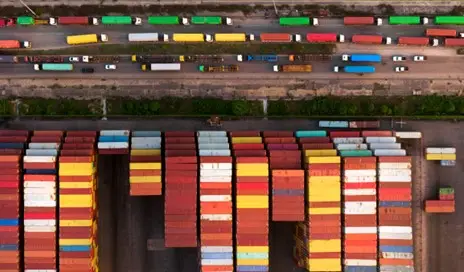This shift, driven by data-driven technologies and interconnected ecosystems, isn't just about efficiency but building a sustainable, transparent, and trustworthy system.
But why is going digital so crucial?
The Need for Digital Transformation
- Rising Complexity: According to the World Economic Forum, global trade flows will double by 2050. In today’s dynamic and complex business environment, an effective supply chain has become a critical factor for organizations seeking to maintain a competitive edge. This complexity demands real-time data and integrated systems to ensure smooth operations and bring end-to-end visibility to the entire value chain.
- Sustainability Imperative: BCG reports that logistics account for 7-10% of global greenhouse gas emissions. Digitization, through robust planning for route optimization, consolidation, and smart warehousing, can significantly reduce carbon footprint.
- Transparency Drives Trust: Gartner predicts that by 2025, 60% of B2B supply chains will adopt blockchain technology for enhanced transparency and trust. Customers increasingly demand visibility into their products' journey.
Technology Advancements Fueling the Change
- Internet of Things (IoT): Sensors embedded in trucks, containers, and warehouses provide real-time visibility into location, quality, and quantity conditions, and performance, enabling smarter decision-making.
Artificial Intelligence (AI): AI-powered algorithms analyze vast data sets to optimize routes, predict delays, and ensure on-time delivery, minimizing wasted resources and fuel.
- Blockchain: This secure distributed ledger technology fosters trust and transparency by creating an immutable record of every transaction, enabling track-and-trace capabilities and preventing fraud.
- Advanced Analytics: The role of advanced analytics is to leverage data to add more insights, with more accuracy to make informed decisions. This can be enabled by assimilating various data through technology interventions and bringing meaningful insights.
How Companies Can Adapt:
- Start Small, Scale Smart: Begin by digitizing key processes like warehousing or transportation management. Choose solutions that integrate seamlessly with existing systems to optimize available resources.
- Invest in Talent: Upskill your workforce to understand and utilize new technologies. Foster a culture of continuous learning, improvement, and data-driven decision-making.
- Collaborate with Partners: Partner with technology providers and other supply chain players to create interconnected ecosystems that unlock the full potential of digitization.
The future of logistics lies in embracing the digital revolution. Companies that actively invest in digitization will not only survive but thrive in this rapidly evolving landscape, building a sustainable, transparent, and trustworthy supply chain that benefits all stakeholders. Digitization is not just an option, it's a necessity.
As we speak about the digital supply chain and its importance towards enhanced visibility & controls, having access to accurate and timely information can identify inefficiencies & and bottlenecks leading to improved communication and cost optimization.
Click here to learn more about LOCATE, our homegrown, integrated, single-window platform, that can manage entire contract, shipment, and logistics operations digitally, right from Deal to Delivery. LOCATE also provides end-to-end visibility through real-time insights and analytics to optimize supply chain operations, enhance responsiveness, mitigate risks, and improve overall supply chain efficiency. Talk to us to learn more.
Let’s start a conversation








